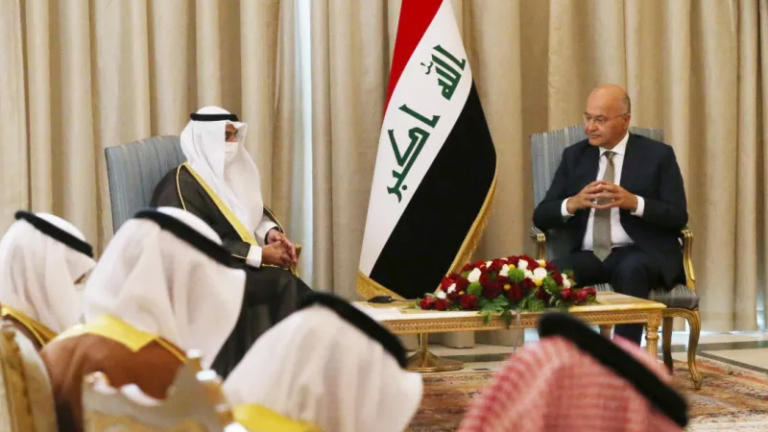
The Gulf Arab states practiced an almost unified approach to post–2003 Iraq, which was generally derived from their established alliance following the 1990–1991 Gulf War. After the US invasion, this Saudi Arabia-led alliance failed to maintain warm relations with the country’s successive governments, nor did it challenge Iran’s growing influence. However, a structural change in Baghdad that reflected a governmental willingness to balance relations with the surrounding region, as well as differences in the GCC countries’ priorities and strategies toward Iraq, allowed slightly more opportunity for improved relationships and collaborations. Emphasizing economic over political relations with Iraq is more likely to effectively serve the GCC states’ purpose of restoring more collaborative ties with their neighbor to the north.
Iraq-Gulf Relations: A Brief Overview
The government of Prime Minister Nouri al-Maliki was overshadowed by sectarian politics, which helped to strain Gulf–Iraq relations. Additionally, Gulf states lacked a unified, consistent, and strategic approach because of different forms of support in the Iraqi domestic scene. They had hesitated to invest economically in Iraq because the Iran-backed groups held economic and political monopolies in many areas. Adding a level of complication were inefficiencies in Iraq’s bureaucracy that hindered the establishment of full bilateral economic collaboration.
It is important to point out that Saudi Arabia holds the United States and its allies responsible for allowing the spread of Iran’s political and military influence in Iraq. But with the offensive by the so-called Islamic State (IS) in 2014, the Gulf states felt motivated to re-build relations with their neighbor, especially in the period of Maliki’s replacement, Prime Minister Haider al-Abadi (2014-2018). The presence of a common enemy and the new premier’s attempt to de-sectarianize Iraq’s domestic and foreign policy presented a major breakthrough for the relationship since the GCC states were worried about IS and the increased power of pro-Iran groups and their influence in state institutions. This GCC fear was confirmed when oil facilities in Saudi Arabia were attacked in 2019.
Iran, on the other hand, has significant relationships and ties across Iraq’s political, social, economic, and military sectors. Its close involvement in the country—augmented by the desire to avenge the assassination of Quds Force Commander General Qassem Soleimani—has also strengthened and widened its economic and political reach in the region.
The Gulf’s Diverse Approaches to Iraq
Among the Gulf states, Saudi Arabia, Kuwait, the United Arab Emirates (UAE), and Qatar have interacted the most with Iraq after 2003. Riyadh has conducted a heavily political approach that shifted from fragile to more robust relations; Kuwait’s perspective has been dominated by the compensation payments for the 1990 invasion and other aid; Abu Dhabi has emphasized business relations; and Qatar has switched from a Sunni-centric to a more pragmatic outlook.
Saudi Arabia’s foreign policy in Iraq has been dominated by an anti-Iran approach that intends to win a regional cold war against the Islamic Republic.
Saudi Arabia’s foreign policy in Iraq has been dominated by an anti-Iran approach that intends to win a regional cold war against the Islamic Republic in a country that is heavily influenced by Iran-backed groups, associations, and politicians. Relations with Iraq have been enhanced in various fields such as entertainment and media through the launch of MBC Iraq in February 2019. The network is a part of Saudi Arabia’s Middle East Broadcasting Center Group which is the region’s most prominent and popular entertainment TV channel. Despite MBC Iraq’s focus on entertainment such as movies, shows, arts, and comedy, many Iran-affiliated groups and politicians claimed that Riyadh is pursuing a political propaganda strategy in Iraq. Regardless of the intentions, the founding of a channel with Iraqi viewers as a target audience reflects Saudi Arabia’s attempt to culturally re-establish itself in Iraqi society following years or decades of near absence. The economic incentives argument emerged as Riyadh slowly started realizing that political competition with Tehran in Iraq is a waste of time. The visit of Prime Minister Mustafa al-Kadhimi to Saudi Arabia in March 2021 reflected a major development in bilateral relations; the two countries established a joint $3 billion Saudi–Iraqi fund to enhance cooperation in the fields of energy, renewables, gas, oil, electricity, construction, and other economic areas.
Kuwait’s historical concern with Iraq is not sectarian but rather a fear for its own survival as an independent country. Kuwait’s relations with post–2003 Iraq were not clear until the two countries cooperated in eliminating IS as a movement and ideology during Premier Abadi’s term. By then Kuwait, like other GCC states, had decided to establish a more collaborative relationship with Iraq. The Iraq donor conference hosted by Kuwait in February 2018 signaled a major development in bilateral relations, as it reflected Kuwait’s willingness to support uplifting Iraq’s economy and trust it as a neighbor. However, the Iraqi government’s formation at the time was facing a delay and other GCC countries were reportedly still hesitant to fully support Iraq until it was clear who would be governing the country. The recent United Nations Security Council Resolution 2621 proclaiming the fulfillment of the compensation requirement on Iraq to Kuwait represents a serious step on the road to full normalization of relations.
To portray itself as a nonthreatening economic actor, the UAE’s engagement with Iraq is heavily focused on investments in energy projects and trade sectors. For most of its post–2003 engagement with Iraq, Abu Dhabi followed the Saudi political lead, which prioritized challenging Iran, but only up to a point. Nevertheless, Emirati officials are always hesitant to increase their investment in Iraq due to fear of Iranian attacks. However, the UAE’s recent rapprochement with Iraq is believed to be part of a wider strategy of re-shuffling the dynamics of the regional balance of power where Abu Dhabi is unilaterally building stronger ties with Israel, Turkey, and Syria in an attempt to decrease its reliance on US support.
Qatar’s relationship with Iraq has been dominated by two dynamics: sports and politics.
Qatar’s relationship with Iraq has been dominated by two dynamics: sports and politics. When Iraqi stadiums were banned by FIFA for security reasons, Doha hosted Iraq’s ‘home’ matches while many former and current Iraqi football players played and worked in Qatar, such as Adnan Dirjal, who is now Minister of Sports and Youth in Iraq. Doha’s post–2003 political approach, like Turkey’s, was arguably Sunni-centric, but it has undergone a reshuffle after the Saudi-led blockade of Doha between June 2017 and December 2021. In an increasingly divided Gulf, both Riyadh and Doha have engaged in bilateral attempts to diversify their relations across the ethnic–sectarian spectrum in Iraq.
Baghdad Conference: Iraq’s New Regional Role
The Baghdad Conference for Cooperation and Partnership in August 2021 was attended by French President Emmanuel Macron, Egyptian President Abdel Fattah al-Sisi, Jordanian King Abdullah II, Qatari Emir Tamim bin Hamad Al Thani, Emirati Vice President and Prime Minister Mohammed bin Rashid Al Maktoum, and Kuwaiti Prime Minister Sabah Al-Khalid Al Sabah. Also in attendance were the foreign ministers of Iran, Saudi Arabia, and Turkey and the secretaries-general of the Arab League, the Organization of Islamic Cooperation, and the Gulf Cooperation Council.
The conference format and the constructive dialogue focused on regional cooperation against common challenges and “security, reconstruction, foreign investment, climate change and political, economic and security partnerships in Iraq.” It reflected a Gulf and regional willingness to accept and support Iraq’s re-entrance in the area’s less politicized arenas.
Was the Baghdad Conference purely an attempt for regional support and acceptance of Iraq’s regional re-emergence, or was this new Iraqi role necessary for the Arab states to contain Iran’s influence? Either motive emphasizes a new role for Iraq in the region, and particularly among its Gulf neighbors, as was evident later when Iraq hosted Saudi-Iranian talks to ease tensions—a major development in Iraq’s mediating regional role. What may affect this role is the current suspension of talks and continuing differences in Iranian and Saudi perspectives on regional cooperation.
The remaining question is whether Iran is prepared to accept Iraq’s re-establishing its Arab—and particularly its Gulf Arab—ties.
The remaining question is whether Iran is prepared to accept Iraq’s re-establishing its Arab—and particularly its Gulf Arab—ties. Iranian Foreign Minister Hossein Amir-Abdollahian violated diplomatic protocol during the Baghdad Conference by stepping toward the front row, which was designated for heads of states—a move that was criticized even by local Iranian media outlets and former diplomats. Iran’s foreign minister responded to all criticism by claiming that he stood in the Islamic Republic’s “real place”—a statement that undermines potential progress in Iran–Gulf relations and Iran’s readiness to accept better Iraq–Gulf ties.
Potential Areas to Explore
Analysts usually identify differences in Iranian and Gulf state approaches to Iraq. Gulf states invest in the country’s economy and institutions without trying to interfere politically in Iraq’s policies. Such an approach benefits Gulf–Iraq relations for two mains reasons. First, it is almost strategically impossible for a regional player to compete with Iran’s network of influence in Iraq without an international military intervention. Second, it is tactically more rational for a new partner (the GCC in this case) to compete with an existing influential actor (Iran in this case) in Iraq in areas of soft power such as education, healthcare, infrastructure, and real estate, among others.
A new factor affecting Iraq–Gulf relations is that Iraq has nearly completed compensating Kuwait for its invasion of 1990. Iraq paid $52.4 billion over 30 years. Ending the compensations scheme will very likely have positive repercussions on Iraq–Gulf relations, as Iraq will save between 3 and 5 percent of its oil revenue. Timely repayment also gained credibility for the Iraqi governments in adhering to international commitments. With stronger trust within the region, Iraq might allow Gulf oil companies to exploit Iraqi natural gas; it might also secure a connection with the Gulf electricity system.
Since the war against IS and its direct major threat are over (except for the threat posed by its sleeper cells), Iraq is witnessing a major popular distancing from Iran’s influence, both electorally and politically. These regional developments, coupled with Iraq’s completion of its payments to Kuwait, suggest that the Gulf states should fully engage with Baghdad. A more effective and proactive Gulf investment into and engagement with Iraq could demonstrate the willingness of Gulf states to establish a permanent and successful partnership. Indeed, the Gulf states should stop conditioning their potential relationship with Iraq on Iran’s influence in the country (the approach they have adopted in Lebanon). Competing with Iran in Iraq and Lebanon will only further destabilize those countries and the wider region. Offering economic incentives, however, may further decrease Iran’s political and paramilitary monopoly in the Iraqi and Lebanese domestic scenes, or even encourage Tehran to transform its role from the political to the economic.
So far, the Gulf states’ approaches toward Iraq have evolved from almost failed hard power attempts to soft power approaches. The new Gulf tactic toward Iraq also suggests a potential shift from political to economic interests.
So far, the Gulf states’ approaches toward Iraq have evolved from almost failed hard power attempts to soft power approaches. The new Gulf tactic toward Iraq also suggests a potential shift from political to economic interests focusing on media, business, trade, entertainment, sports, and infrastructure. Nevertheless, they lack strategic consistency in the relationship and have little progress to show after the initial announcements of committees and partnerships.
The GCC countries need to further understand the Iraqi market in a way that would allow them to find ways to meet its challenges. Convincing the Iraqi government to reform Iraq’s investment institutions just to pave the way for external investors (from the GCC, for instance) could lead to unpopular reactions by the public and is easily exploited by opponents of better GCC–Iraq relations. The more effective strategy is to address Iraq’s economic and business elites and its people in a manner that acknowledges their interests and the warm ties that have historically been the bedrock of Iraq–GCC relations.

